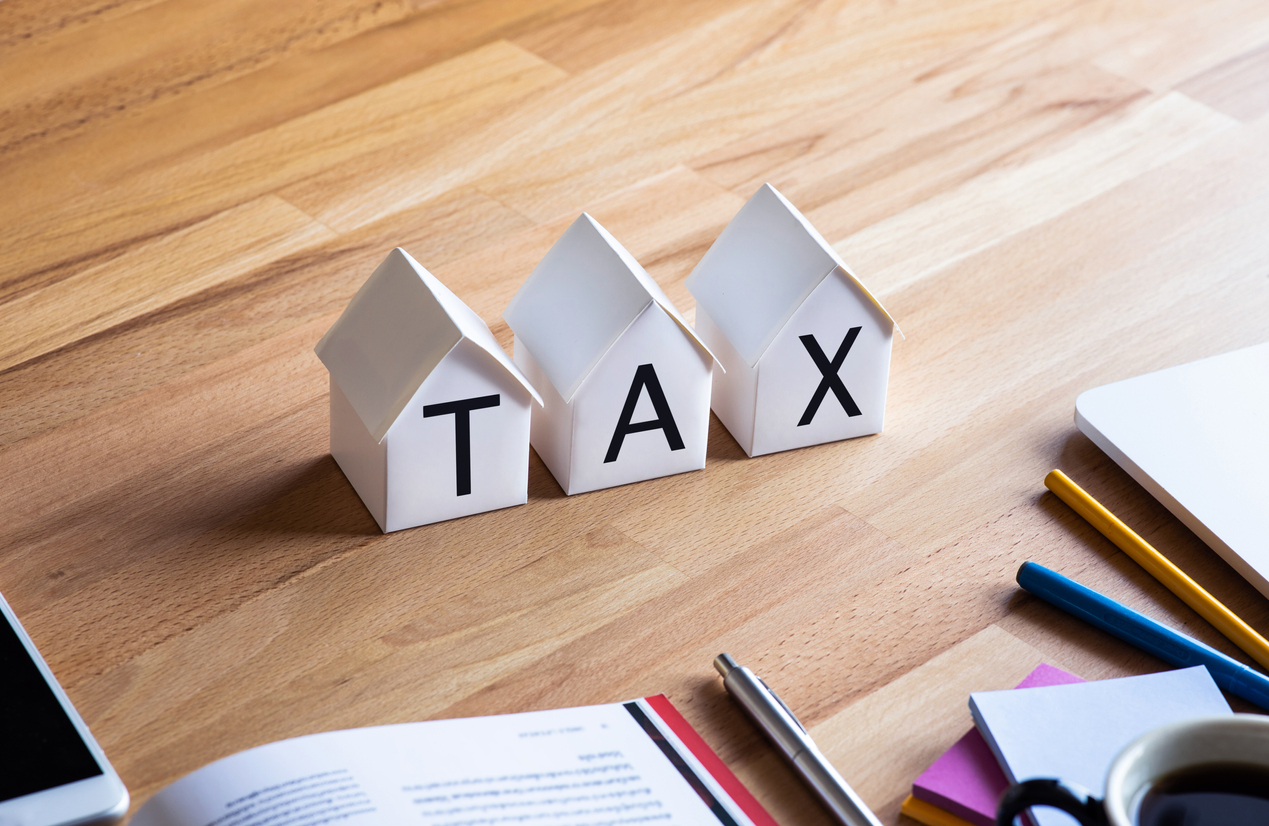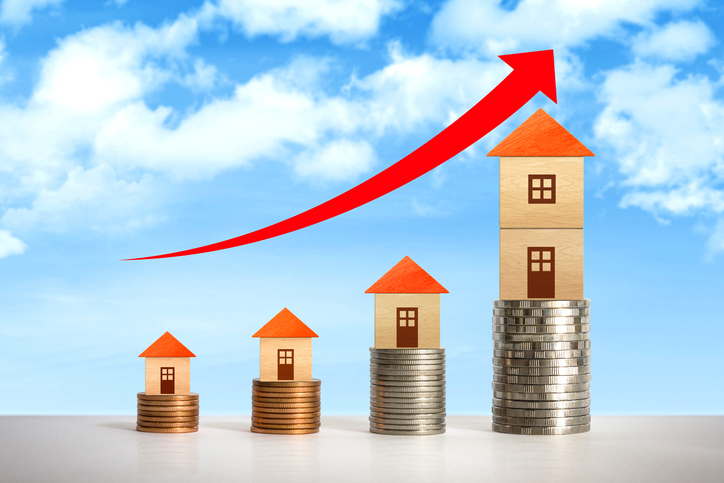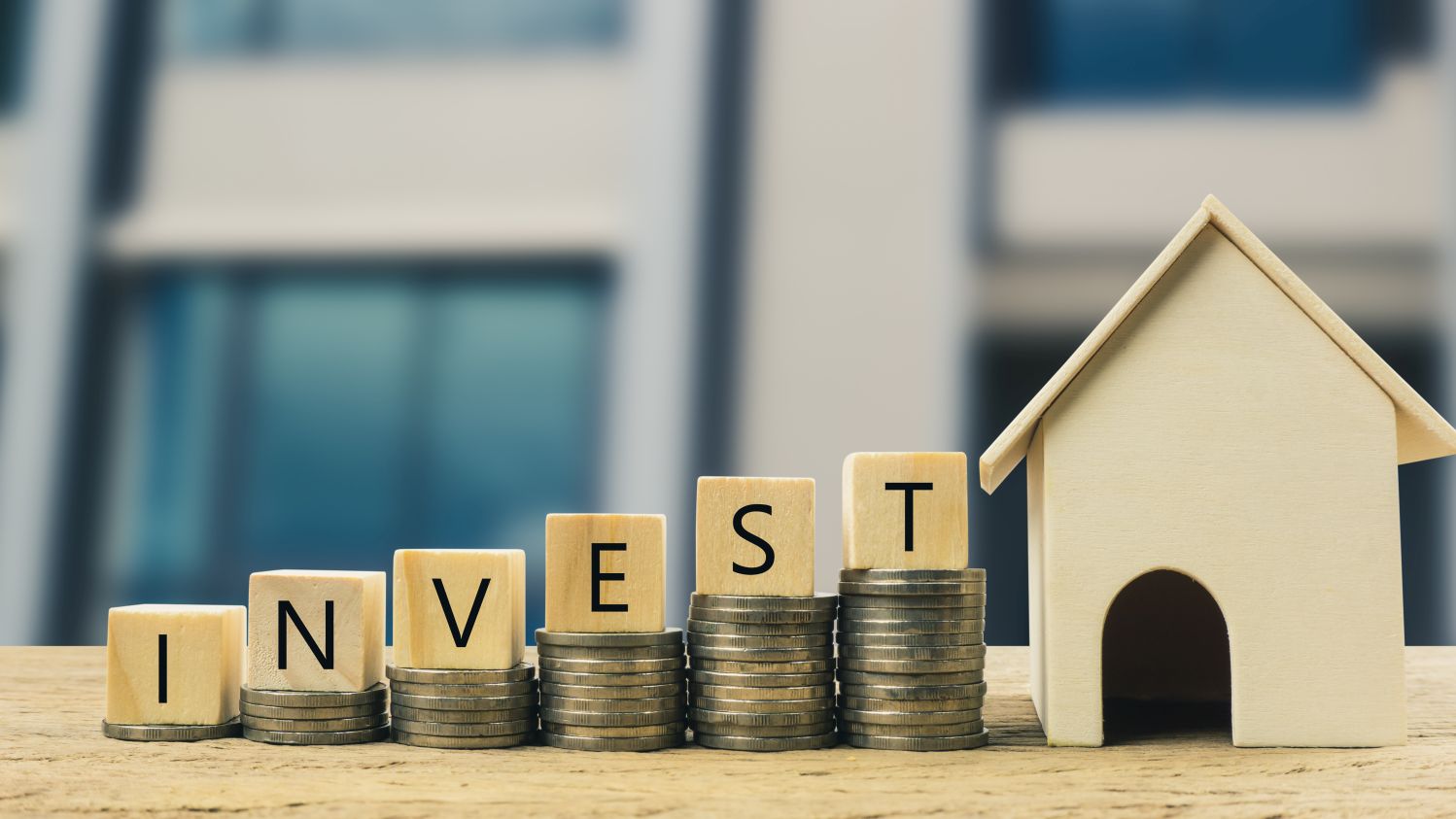In the wake of escalating wildfire risks and a rapidly
changing environmental landscape, major property
insurers are taking steps that could drastically alter the
state of homeowner insurance in California. Read more...
In the wake of escalating wildfire risks and a rapidly
changing environmental landscape, major property
insurers are taking steps that could drastically alter the
state of homeowner insurance in California. Farmers
Insurance, a significant player in the state's insurance
market, has recentl
|
In today's ever-evolving financial landscape, investors are often faced with the challenging decision of where to allocate their hard-earned money. Two popular investment avenues, real estate and the stock Read more...
In today's ever-evolving financial landscape, investors are often faced with the challenging decision of where to allocate their hard-earned money. Two popular investment avenues, real estate and the stock
|

A question a have been getting regularly lately is “If interest rates are so high, why aren’t prices coming down?!” I get this question from students in our real estate license school as well as Read more...
A question a have been getting regularly lately is “If interest rates are so high, why aren’t prices coming down?!” I get this question from students in our real estate license school as well as from past and potential clients.
This is a totally understandable question to ask, especially given the fact that interest rates have more than doubled in the past few years. The real estate market is experiencing high mortgage rates and an unprecedented housing inventory shortage - the market seems to be at a stalemate. This isn’t just true in southern California where we operate a real estate school and provide real estate crash courses to prepare folks for the real estate exam - this story is true all across the United States. The reality is that most U.S. homeowners remain tethered to their current homes due to significantly lower mortgage rates locked in over previous years.
A recent analysis by Redfin revealed that nearly 92 percent of homeowners with mortgages have an interest rate below 6%, much lower than the current average mortgage rate of 6.71%. "Why would I want to sell my house when I have a really low 3% interest rate on my mortgage? If I buy a new house, I might end up with an interest rate that could be twice as high as my current one!” is the sentiment of many.
As a consequence, the lack of available homes for sale has led to the housing market entering a very odd place, as noted by Redfin's Deputy Chief Economist, Taylor Marr. The reluctance from homeowners to list their properties, fostered by the significantly higher current mortgage rates, is stagnating the market, making it difficult for buyers to find suitable properties. There just isn’t enough inventory.
A bit of bright news for the market is that the Federal Reserve in its most recent meeting opted against an 11th consecutive interest rate increase, which signaled a "hawkish pause" as it evaluates the impact of the previous rate hikes. However, the Fed indicated the likelihood of two more quarter percentage point increases by the end of the year, pushing the median expectation to a funds rate (not mortgage rate) of 5.6% by the end of 2023.
The pause in interest rate hikes is intended to allow the Fed to monitor the impacts of its policy moves as it battles uneven but optimistic signs of inflation being under control. The decision resulted from various factors, including solid labor market performance and, as previously mentioned, slowing inflation rates. The future outlook suggests the possibility of rate cuts beginning in 2024, with raised expectations for economic growth and an optimistic outlook on unemployment rates. The inflation projections were also adjusted, but the overall impacts of the policy adjustments are yet to be fully realized in the economy. It has been said that an economy as large as the United States’ is like turning an aircraft carrier. To move in another direction requires turning the wheel miles and miles ahead of time.
On a national level, regions where the inventory shortage is particularly acute include Hartford, Connecticut, and Buffalo, New York. Housing inventory hovers near record lows in these markets, where new construction is scarce. Hartford had just 1.4 months of housing supply in December, while in the past, a balanced housing market was considered to have between four and six months of supply.
"Months of housing supply" is a metric often used by real estate professionals to measure the balance between supply and demand in the housing market. It's calculated by taking the current inventory of homes for sale and dividing it by the current sales rate (the number of homes sold per month).
In this context, if Hartford has 1.4 months of housing supply, it means that at the current sales pace, all the homes currently listed for sale would be sold in approximately 1.4 months, assuming no new homes are listed.
On the other hand, a balanced housing market is typically said to have between four and six months of supply. This means that it would take four to six months to sell all the homes currently on the market at the current sales pace. If the months of supply are less than this (like 1.4 months in Hartford's case), it generally indicates a seller's market because demand is outpacing supply. If it's more, it could be a buyer's market because supply exceeds demand.
Therefore, Hartford's low 'months of housing supply' indicates a significant shortage of homes for sale compared to the number of interested buyers, leading to increased competition among buyers and potentially higher home prices. It’s the same story around much of the United States as low inventory continues to squeeze the housing markets all across the country. California is no exception.
In addition to high mortgage rates, other factors contributing to low inventory include older Americans opting to age in place, investors purchasing homes for renting purposes, and the lack of new construction. Buyers priced out of major markets are relocating to smaller cities, creating demand in areas traditionally not associated with a housing crunch. This leads to emotionally charged house-hunting experiences, buyers are left with few options and the prospect of waiting long periods to find their dream home.
Meanwhile, investor activity is also altering the market dynamics, with the proportion of single-family homes purchased by investors increasing from 15-16% each year from 2012 to 24% in 2021 Cities such as Austin, Nashville, and Dallas, which experienced bidding wars and price hikes in recent years due to low inventory, are now seeing a leveling off of prices due to increased available homes.
The U.S. housing market currently presents a bittersweet scenario. With homeowners holding on to their homes and the housing inventory at record lows, it's a challenging time for those looking to enter or navigate the market. As things stand, the market remains skewed, favoring neither buyer nor seller, and it's a situation that appears likely to stay the same in the immediate future.
It's essential to understand that such fluctuations and shifts present unique opportunities for those interested in the world of real estate. Yes, mortgage rates are high, and inventory is low, but this only increases the need for competent, understanding, and proactive real estate professionals who can navigate this challenging terrain. Obtaining a real estate license isn't just about selling homes; it's about understanding market dynamics, providing sound advice, and adapting to changing circumstances. This unique state of the market offers a wealth of learning experiences and the potential for lucrative returns. Moreover, as the market stabilizes and evolves, there will be a strong demand for qualified professionals to guide clients through their real estate journey.
Remember, every market condition brings its own advantages and opportunities – the key lies in being prepared and willing to leverage them effectively. So, don't be discouraged. Embrace the opportunity to learn, grow, and become a valuable player in the real estate industry.
Love,
Kartik
TLDR: The U.S. housing market is currently experiencing a unique state characterized by high mortgage rates and an unprecedented low inventory, leading to a market stalemate with homeowners reluctant to sell due to lower locked-in mortgage rates. However, the market's fluctuations are seen as opportunities for competent real estate professionals to navigate these challenges, understand market dynamics, and leverage changing circumstances to their advantage.
|

I never imagined that I'd be writing an article on the entertainer Drake for our real estate school blog, yet here I am. I previously authored an article discussing the trend of individuals relocating Read more...
I never imagined that I'd be writing an article on the entertainer Drake for our real estate school blog, yet here I am. I previously authored an article discussing the trend of individuals relocating from California to other states, specifically during the COVID pandemic. However, the news of Drake reportedly putting his final US property on the market has piqued my interest.
First, for our real estate school students who are interested in breaking into luxury real estate, this is particularly appropriate as the same licenses that you would need to sell a small condo in southern California is the same license that allows you to sell a mansion like the one discussed in this article.
Canadian-born rapper Drake is reportedly saying goodbye to America as he lists his final US property, an $88 million Beverly Hills estate, for sale. The Grammy award-winning artist has allegedly decided to return to his hometown of Toronto, where he resides in a custom-built mansion. The Beverly Hills estate is a stunning Tuscan-style home boasting luxurious features and amenities, increasing appeal to what is certainly a narrow buyer pool.
The KAA Associates designed property Drake is selling has a celebrity ownership history, with British pop star Robbie Williams initially purchasing the property before Drake acquired it for $75 million in 2022. The sprawling estate is situated on a roughly 19.7-acre lot in the verdant hills of Benedict Canyon.
Public records indicate a structure size of 24,260 square feet featuring 10 bedrooms and 22 bathrooms, offering ample space for both living and entertaining. Its resort-style landscaping and incredible city, ocean, and mountain views create an atmosphere of luxury and relaxation.
According to sources, the property is stacked with lavish amenities, including a circular motor court with water fountains, a grand columned entryway, a double-height foyer, and a sweeping grand staircase. The living spaces feature two fireplaces, a library with built-in cabinets, a formal dining room, and a gourmet kitchen with a breakfast room.
Additional features include a professional screening room, wine cellar, gym, game room, hidden tennis court, and an 11-car garage. The estate also boasts a pool/guest house with a mosaic-tiled pool, an indoor-outdoor kitchen, and an orchard with mature olive trees and ancient oaks. The 11-car garage is appropriate as the musician is known to have a car collection consisting of a 2016 Ferrari LaFerrari, a 2010 Mercedes SLR McLaren, and even a coveted Bugatti Veyron, according to British GQ magazine.
Drake has recently sold off a string of US properties totaling $26 million. The sales include a trio of properties in the Hidden Hills neighborhood of Los Angeles, purchased by various buyers, including LA Rams quarterback Matthew Stafford and former US assistant attorney general Makan Delrahim.
In Toronto, Drake's custom-built 50,000-square-foot mansion serves as his primary residence. The property features an NBA-regulation size indoor basketball court and numerous other lavish amenities. The rapper's intention behind the home's design was to create a timeless, monumental structure that would stand firm for 100 years.
Drake's decision to sell his final US property and focus on his Canadian roots demonstrates his commitment to his hometown of Toronto. With no known plans to purchase any other properties in the United States in the near future, the rapper's luxurious Beverly Hills estate is now up for grabs, offering a rare opportunity for potential buyers to own a piece of celebrity real estate.
As always, if you are interested in a career in real estate, reach out to our school at www.adhischools.com or call us at 888-768-5285.
Love,
Kartik
|

Los Angeles is currently grappling with a significant homelessness crisis, and city officials are searching for ways to address this pressing issue. One idea that went into effect recently is the so-called Read more...
Los Angeles is currently grappling with a significant homelessness crisis, and city officials are searching for ways to address this pressing issue. One idea that went into effect recently is the so-called “mansion tax”, a controversial policy that has generated considerable debate among residents. While some argue that the tax is necessary to alleviate the city's housing crisis, others contend that it unfairly punishes wealthy property owners and successful individuals. I wanted to write an article that delves into the complexities surrounding the mansion tax, exploring both the benefits of the tax in addressing homelessness and the concerns about its potential negative consequences.
Most of our real estate classes are now on Zoom and done virtually, but I taught at a couple of real estate schools on the Westside of Los Angeles for many years and several of our students wanted to break into luxury real estate and I’m curious to know what you think.
Understanding the Mansion Tax
On April 1, 2023, a so-called “mansion tax” was enacted in Los Angeles. The tax applies to property sales at or over $5,000,000, with an increased rate for sales of $10,000,000 and above.
The tax was approved by voters in November 2022 as a city-wide tax, implementing a 4% tax on properties that sell for $5 million or more and 5.5% on properties that sell for $10 million or more. The mansion tax aims to raise about $900 million yearly for affordable housing, homelessness programs, and other related initiatives. However, the tax has faced criticism from real estate brokers, developers, and property owners.
Arguments for the Mansion Tax
Proponents of the mansion tax argue that it is a much-needed source of revenue to address the affordable housing crisis and homelessness in Los Angeles. The tax is expected to generate millions of dollars earmarked for subsidized housing, housing acquisition and rehabilitation, rent assistance, and homelessness-related programs. Advocates say the tax will help bridge the gap between the rich and the poor and provide resources for those in need. A 2022 UCLA study found that the mansion tax's potential impacts on new construction would be minimal, suggesting that the tax will not significantly deter developers from building new properties in Los Angeles.
The mansion tax in Los Angeles, despite its drawbacks, offers several benefits that could potentially help address the city's homelessness problem:
1. Generating Revenue for Affordable Housing and Homelessness Programs: The mansion tax is estimated to raise about $900 million annually, which can be directed towards various initiatives focused on tackling the housing crisis and homelessness. This additional funding can support the construction and preservation of affordable housing units and provide rent assistance to those in need. It can also help fund comprehensive homelessness programs, such as emergency shelters, permanent supportive housing, mental health services, and job training programs, essential in addressing the root causes of homelessness.
2. Progressive Taxation: The mansion tax is a form of progressive taxation, as it targets high-end property sales and wealthier individuals who can afford to pay a higher tax rate. This approach can help reduce income inequality and bridge the gap between the rich and the poor. By imposing a higher tax on luxury properties, the city can allocate more resources to support vulnerable and low-income residents, often disproportionately affected by the housing crisis.
3. Encouraging Efficient Use of Land: The mansion tax might encourage more efficient land use in Los Angeles. Luxury properties often occupy large plots of land, and the mansion tax could motivate property owners to either downsize or sell their land to developers who might build more affordable housing units in its place. This could ultimately increase the overall housing supply, alleviating the pressure on the city's housing market and potentially reducing homelessness.
4. Increased Awareness and Involvement: Implementing the mansion tax has generated significant public debate, raising awareness of the homelessness crisis in Los Angeles. This increased attention could lead to greater involvement from residents, businesses, and other stakeholders in finding long-term solutions to the housing crisis. This collective effort could result in developing more effective policies, initiatives, and partnerships to address homelessness in the city.
5. Demonstrating Commitment to Social Responsibility: The mansion tax conveys that Los Angeles is committed to addressing its homelessness problem and working towards a more equitable city. By using tax revenue from luxury property sales to fund affordable housing and homelessness programs, the city demonstrates its dedication to social responsibility and the welfare of all its residents.
The mansion tax in Los Angeles presents several potential benefits that could help alleviate the city's homelessness problem. By generating additional revenue for affordable housing and homelessness programs, promoting progressive taxation, encouraging efficient land use, raising awareness, and demonstrating a commitment to social responsibility, the mansion tax might contribute to creating a more equitable city and ultimately reducing homelessness.
Arguments Against the Mansion Tax
Critics of the mansion tax argue that it may slow the number of new apartment complexes built in the city. The tax applies not only to mansions but also to apartment complexes, retail and industrial buildings, and other structures. Real estate brokers and developers, including those with real estate licenses from real estate school and those who have passed the California real estate exam, warn that the tax will disincentivize developers from building new housing.
Moreover, the tax has faced backlash from wealthy homeowners, including celebrities, who rushed to sell their properties before it went into effect. Some critics argue that the tax may depress property values and force sellers to cut prices to complete deals before the deadline. Additionally, opponents of the tax are concerned about the transparency of how the revenue will be spent, and they argue that the tax may dissuade people from moving to Los Angeles.
Higher Costs: Wealthy individuals considering purchasing a luxury property in Los Angeles might be deterred by the additional costs associated with the mansion tax. In comparison, other cities or states without such a tax might become more attractive for high-end property buyers, leading them to choose alternative locations for their investments. For example, a prospective buyer might opt for a luxury property in Miami, Florida, with no state income tax or mansion tax, making it a more financially appealing option.
Reduced Investment: Investors might also be less inclined to purchase properties in Los Angeles subject to the mansion tax, as it could potentially reduce the profit margin on their investments. This could result in a decline in the city's overall demand for luxury properties, further impacting the real estate market and potentially leading to reduced property values. Consequently, the city could experience a slowdown in real estate investments, which could negatively affect the local economy and limit available resources to address homelessness and other social issues.
Impact on Business and Talent Attraction: Businesses, particularly those in the entertainment and technology industries, often attract high-income employees and executives who might consider purchasing luxury properties. However, implementing the mansion tax could discourage some individuals from moving to Los Angeles. In turn, this could make it more difficult for the city to attract new businesses and retain existing ones and limit its ability to draw in top talent across various industries.
Celebrity Exodus: Los Angeles is known for being home to numerous celebrities who often own high-end properties. The mansion tax could potentially prompt some of these high-profile individuals to sell their properties and relocate to areas with lower taxes, as seen in the backlash from wealthy homeowners who rushed to sell their properties before the tax went into effect. This exodus could further contribute to the decline in property values and negatively impact the city's image, tourism, and the overall economy.
In conclusion, implementing Los Angeles' mansion tax has stirred a significant debate in the city's real estate market. Advocates argue the tax will generate much-needed revenue to address the city's affordable housing crisis and homelessness issues. However, opponents contend that the tax will dissuade property development, negatively impact non-luxury properties, and ultimately harm the real estate industry in Los Angeles. As real estate professionals with real estate licenses from real estate schools, and those studying for the California real estate exam, monitor the situation, the long-term implications of the mansion tax on the city's real estate market remain uncertain. Time will tell whether this tax proves to be an effective solution to Los Angeles' housing challenges or an obstacle to the city's real estate growth.
As always if you are interested in getting your real estate license, visit www.adhischools.com or click here for a real estate exam crash course. Or if you’re old school - call us at 888-768-5285.
Love,
Kartik
|

The U.S. real estate market changed significantly during 2020 and 2021 during the COVID-19 pandemic. The most obvious change is that many owners fled crowded cities to suburban and even rural areas fueled Read more...
The U.S. real estate market changed significantly during 2020 and 2021 during the COVID-19 pandemic. The most obvious change is that many owners fled crowded cities to suburban and even rural areas fueled by the possibility of remote work.
A consequence of this was that home inventory was tight and prices soared. Buyers who were lucky enough to purchase and obtain financing in 2020 or 2021 enjoyed ultra low rates on their home loans. Many are wondering if the 2022 market will be tumultuous or if things will normalize.
The following are five housing trends to keep an eye on this year.
1. Housing inventory will increase
Realtor.com® predicts housing inventory will see a 6.6% increase in 2022, which is good news for everyone. More sellers are comfortable putting their homes on the market, and they’ll still enjoy a market that is favorable to them. However, it’ll be competitive since first-time homebuyer percentages are expected to outpace any recovery in inventory that occurs this year. Buyers will have more home options to choose from as more sellers list homes and new construction continues to be on the uptick.
Homes will still continue to sell quickly, and sellers will definitely retain the market advantage. Although, experts both concede and caution there may be levels of uncertainty ahead in 2022 and beyond.
2. Mortgage rates will climb dramatically
Throughout 2020 and 2021, the U.S. experienced breaking-record mortgage interest rates, with an all-time low for a 30-year fixed mortgage occurring in January 2021 at 2.65%. This situation is slowly correcting itself, and rising inflation and consumer spending are contributing to the recent boost in interest rates.
While rates are still lower than previous years, early in 2022, experts predict interest rates will continue to inch back up throughout the year and with inflation rising at a record rate we may see rates get into the 6%+ range by summer of 2022.
3. Home prices will stabilize or decline
As more housing inventory comes on the market and interest rates rise downward pressure on prices is likely. The best properties based on price and condition will continue to see bidding wars, but these might be more isolated.
As price appreciation finally slows down, this will result in some level of home prices cooling.
4. Demand for suburbia continues
The COVID-19 pandemic sent everyone into isolation as people fled from city apartments and townhomes into the suburbs to buy homes, enabling them to have more space to work and play. As levels of normalcy returned in 2021, urban living has become more popular again, but the suburbs are still taking the real estate market by storm.
Realtor.com predicts urban areas will “continue to be pricier and faster-paced,” but people moving to the suburbs will receive “better bang for the buck,” especially since the housing inventory is creeping back up. Many Americans will continue to work remotely so this will play a significant role in their housing decisions – and many of them want the amenities and lifestyle suburban areas offer.
4. Demand for suburbia continues
The COVID-19 pandemic sent everyone into isolation as people fled from city apartments and townhomes into the suburbs to buy homes, enabling them to have more space to work and play. As levels of normalcy crept back in in 2021, urban living has become more popular again, but the suburbs are still taking the real estate market by storm.
5. Technology’s role in the market will increase
Whether you are taking our real estate courses by Zoom or self study, you already know that technology plays a significant role in the real estate market. Don’t expect this to slow down as tech-savvy millennial buyers dominate the buyer pool and the older members of Gen Z are right behind them. These two generations are highly drawn to tech and have come to expect it in most areas of life.
Today’s buyers expect the ability to hop online, increasingly doing so from their mobile devices, to find, view, and purchase homes. Using features such as 3-D virtual tours, interactive floor plans, and other types of touchless services will continue to be the norm. I wrote an article about the use of Matterport cameras when COVID first hit, feel free to check it out.
Additionally, technology will play an important role in other aspects of the home buying process, such as obtaining mortgage approvals and home appraisals through digital channels. Agents are also getting into the action with digital transaction management tools – the market can also expect to see more data analytics and artificial intelligence integration.
The year 2022 will continue to be a hot market like the previous two years but appears to be on the road to normalization. Bottom line, the U.S. real estate market should essentially expect a whirlwind year with some hiccups. If so, this will be due to the pandemic continuing to play a role in market demands, along with supply chain and labor disruptions for new housing.
An important thing to remember is that whether the market is appreciating, declining or staying flat, real estate agents are simply in the middle of a transaction. Up or down we still get paid.
Love,
Kartik
|

You don't need to attend a real estate school, such as ADHI Schools, or pass the real estate license exam offered by Crash Course Online to understand that investing in real estate can be highly rewarding. Read more...
You don't need to attend a real estate school, such as ADHI Schools, or pass the real estate license exam offered by Crash Course Online to understand that investing in real estate can be highly rewarding. In this article, we'll delve into the many benefits of property ownership and discuss how furthering your education and obtaining a license can enhance your ability to capitalize on these advantages.
Steady Passive Income
Many view real estate ownership (particularly home ownership) as a practical solution – no rent payments and stability for years. However, the benefits of owning real estate extend far beyond that, regardless of your investment goals or motivations.
Even if you are starting your real estate journey, you know that real estate offers significant financial rewards, including tenant-paid passive income. Besides the recurring monthly income, property values typically appreciate faster than inflation rates. Over the past 30 years, real estate values have risen by over 5% annually, with recent years showing even more significant increases. This growth makes real estate an attractive option for those looking to establish roots, stabilize their family, or invest in rental properties.
Financial Security
Whether you are discussing owning a single-family home as a primary residence or a rental, real estate ownership is a powerful tool for achieving financial security, as it serves as a tangible asset with the potential for long-term appreciation. By investing in real estate, you can build equity, increasing as you pay your mortgage and the property value rises over time. This equity can be utilized in various ways, such as securing loans or providing a cushion during challenging times. Additionally, rental properties generate a steady stream of passive income, which can contribute to overall financial stability by offsetting mortgage payments or supplementing your primary income source.
Moreover, real estate investments typically offer a hedge against inflation and can diversify your investment portfolio, reducing risks associated with economic fluctuations. Owning real estate paves the way for long-term financial security by providing multiple avenues for wealth generation and protection.
Tax Benefits
Owning real estate offers numerous tax benefits that can significantly enhance an investor's financial situation. One of the most notable tax advantages is the mortgage interest deduction. Up to a specified limit, homeowners can deduct the interest paid on their mortgage from their taxable income, reducing their overall tax liability. In the early years of a mortgage, when the interest payments are generally higher, this deduction can be particularly beneficial.
Another tax benefit of real estate ownership is the property tax deduction. Homeowners can typically deduct up to $10,000 of their local and state property taxes from their taxable income. This deduction can result in substantial tax savings, especially for individuals residing in areas with high property tax rates.
For rental property owners, there are additional tax benefits. They can claim deductions for expenses related to their investment properties' management, maintenance, and operation. These expenses may include repairs, property management fees, insurance, and travel costs associated with maintaining the property. Check out our blog on DIY repairs here if you are a handy investor. Furthermore, rental property owners can take advantage of depreciation deductions, which allow them to recover the cost of their investment over time. Depreciation essentially acts as a non-cash expense, offsetting rental income and reducing the taxable income derived from the property.
For investors, another valuable tax benefit of real estate ownership is the 1031 exchange. This provision allows investors to defer capital gains taxes when selling an investment property, provided they reinvest the proceeds into a like-kind property within a specific time frame. By deferring taxes through a 1031 exchange, investors can rapidly grow their wealth and maintain a more diverse real estate portfolio.
Stability
Imagine a future where you enjoy unparalleled stability and peace of mind, all thanks to a single wise decision: real estate ownership. Unlike the uncertainties of renting, owning a property secures your position, allowing you to take control of your living situation and financial destiny. When you own a home, you eliminate the need to rely on landlords, worry about rent hikes, or face the constant threat of eviction. Instead, you're planting your roots, taking charge of your life, and laying the foundation for long-lasting stability.
In contrast to the precarious nature of renting, real estate ownership allows you to build equity over time. As you pay down your mortgage and your property appreciates, you'll accumulate wealth that can be used for various purposes, such as funding your children's education, financing your dream vacation, or serving as a cushion in times of financial hardship. Furthermore, owning a property provides a sense of accomplishment and pride, knowing you've made a wise investment in your future. This investment offers financial stability and contributes to your emotional well-being as you enjoy the satisfaction of having a space to call your own.
Moreover, real estate ownership offers protection against market fluctuations, making it a relatively stable investment compared to other options like stocks. While the value of stocks can swing wildly based on economic factors and global events, real estate has historically demonstrated consistent growth and resilience, even during periods of economic turmoil. This stability is further amplified by the real estate being a tangible asset backed by the intrinsic value of land and structures, ensuring it will always hold some value.
Stronger community ties
One persuasive argument for the belief that homeowners have stronger community ties than renters is rooted in the long-term nature of homeownership. When individuals or families invest in purchasing a home, they acquire a physical structure and become a part of the local community. This long-term commitment often leads homeowners to develop a vested interest in the well-being and success of their neighborhood. Consequently, they are more likely to engage in activities that contribute to the community's stability, safety, and overall development. Even as a real estate professional, you’ll want to learn how to host these community events to tap into the residents in the area and the community at large to brand yourself as the go-to-agent in the area.
Homeowners are also more likely to form deeper connections with their neighbors, as they share common concerns and goals for their community. This sense of belonging fosters cooperation and mutual support, strengthening social bonds and collective action to address local issues. For instance, homeowners may join neighborhood associations or participate in local events, helping to create a sense of unity and shared purpose. These connections ultimately contribute to a safer, more resilient community better equipped to face challenges and celebrate successes together.
Furthermore, homeowners who take pride in their property are more likely to maintain and improve their homes, yards, and surrounding areas. This investment in the local environment enhances the neighborhood's aesthetic appeal and sends a powerful message about the community's values and priorities. As a result, areas with high homeownership rates often experience lower crime rates, increased property values, and a greater sense of safety and well-being among residents.
In conclusion, the long-term commitment and shared interests that come with homeownership encourage individuals and families to invest their time, energy, and resources in their communities. This increased investment leads to stronger community ties, improved neighborhood stability, and a safer, more vibrant living environment for all residents. While renting may offer certain short-term advantages, homeownership fosters a more profound sense of connection and responsibility that ultimately benefits the individual homeowner and the entire community.
Retirement security
A compelling argument favoring homeownership as a means to secure financial stability during retirement revolves around reduced or eliminated housing costs. For many retirees, housing expenses constitute a significant portion of their monthly budget. By owning a home that is fully paid off by the time they retire, homeowners can effectively eliminate one of their most significant financial obligations, freeing up resources for other needs and desires during their golden years. In contrast, renters will likely continue to face rent payments throughout their retirement, which can be particularly burdensome when living on a fixed income, especially if the rent increases with regularity.
In addition to reduced housing costs, homeownership can also provide retirees with a valuable financial asset. As the value of a home typically appreciates over time, homeowners can benefit from the increased equity they have built up in their property. This equity can be accessed during retirement in several ways. For instance, retirees may choose to downsize by selling their current home and purchasing a smaller, more affordable property, thus freeing up cash to supplement their retirement income. Alternatively, they may opt for a reverse mortgage, converting a portion of their home's equity into tax-free income without selling or moving.
Moreover, homeownership offers retirees the flexibility to generate income by renting out a portion of their property. This option can be particularly advantageous for those with additional space, such as an in-law suite, a finished basement, or a separate dwelling unit. By renting out this space, retirees can establish a steady stream of income that can help them maintain their quality of life and cover other expenses during retirement, such as healthcare costs and leisure activities.
Homeownership provides retirees with significant financial advantages contributing to a more secure and comfortable retirement. By eliminating or reducing housing costs, offering the opportunity to access built-up equity, and presenting options for additional income generation through renting, homeownership serves as a reliable foundation for financial stability in one's later years. Contrastingly, renters may face ongoing housing expenses and a lack of financial flexibility, potentially leading to a more challenging retirement experience.
The end of the day, the numerous benefits of homeownership solidify its position as a superior option to renting and a practical path to wealth creation. By allowing individuals to build equity, providing long-term stability and control, and offering tax benefits, owning a home is a wise financial decision. Moreover, homeownership fosters stronger community ties, ensures privacy, and instills a sense of pride and accomplishment. Additionally, real estate ownership demonstrates its enduring value as a hedge against inflation and a means of securing financial stability during retirement.
Investing in real estate empowers individuals to take charge of their financial future, transforming their living space into a tangible asset that can generate wealth and security for years.
Love,
Kartik
|

The California housing market stayed blue-hot through 2021, leaving many potential home buyers waiting in the wings. Whether you are getting your real estate license or are a retail consumer, you might Read more...
The California housing market stayed blue-hot through 2021, leaving many potential home buyers waiting in the wings. Whether you are getting your real estate license or are a retail consumer, you might be wondering if home prices will continue to rise through 2022. On the flip side, you’re undoubtedly interested in whether or not the market might cool off, so you can finally make your big purchase. To figure all that out, you just have to take a peek at this guide to learn all you need to know about the housing market conditions in California.
2021 Housing Market Outlook
All across California, the already expensive housing market got even pricier as 2021 went on. This was a surprise to most people, as many thought that the pandemic would wreak havoc on the real estate market. To be fair, I have been a bear since 2018 as evidenced in this YouTube video.
In reality, quite the opposite has occurred since this recording. Prices have continued to rise through the pandemic with record jumps in home prices in the suburbs outside Sacramento, Riverside, and other urban centers. Inside the city centers, property prices continued to rise as well, although not quite as fast as the suburbs. Most people attribute this to the desire for social distancing and being a little further away from one another.
Overall, reports indicate that single-family home prices rose by over 12 percent through 2021 in many areas, landing thei median price tags in the $800,000 range by year’s end. Although that’s double the median sales price for homes across the United States, certain areas of California have even higher typical home prices. In San Francisco, for example, homes sit at $1.5 million on average, while homes in upscale Montecito often have an eye-watering $6.5 million asking price.
Cooling Ahead in 2022
The price hikes naturally result from low housing inventory and high demand, which will probably change at least a little in 2022. The always rosy-eyed California Association of Realtors projects that the cost of homes across the state will increase by a rather moderate 5.2 percent. Their housing and economic forecast points to the economic recovery, remote workforce, and overall supply/demand status as the factors driving the continued price increases.
These price increases will likely be tempered by rising interest rates. Mortgage interest rates have continued to stay at historic and unsustainable lows for more than a decade. The likelihood of rates staying at these low levels is extremely low without triggering massive inflation.
The combination of increased inventory coupled with decreased demand due to higher interest rates will likely cause the housing market to cool in 2022.
Should you buy now?
If you have the means and truly want to buy a home in California, consider getting all your ducks in a row and taking the plunge. Over the long run, California home prices have continued to march ever upward, after all, as California continues to attract people from far and wide. While rates will likely rise significantly in 2022 and there might be short-term downward pressure on prices this will only be for a period until prices rise again.
Timing the market is an impossible feat.
Not sure if it’s smart to start looking for a home to buy? Reach out to me at the office or through Instagram direct message.
Either I or a member of my team will be able to guide you appropriately. We can discuss your options and help guide you through your home buying journey.
If you’re reading this as you study for the California real estate exam I suggest you read more of my blogs to get acquainted with the real estate market.
Love,
Kartik
|

Hi all:
I wanted to give my readers a bit of a public service announcement with this article. Recently, 74 people were indicted on wire fraud related to real estate purchases.
How does this scheme Read more...
Hi all:
I wanted to give my readers a bit of a public service announcement with this article. Recently, 74 people were indicted on wire fraud related to real estate purchases.
How does this scheme work? Hackers are locating people who are in the process of buying a home or other real estate. The hacker then spoofs an email from the escrow company that you are using for your particular home or building purchase. Wiring instructions are sent saying something like, “Your down payment’s should be sent to our escrow company. Here are our routing number and account numbers.”
As it turns out, that’s not the routing number nor is it the account number of the escrow company, and hardworking Americans send their money to these scammers.
If you’re in the process of buying a piece of real estate my hope is that your escrow company is shares this information with you. It is absolutely mission critical that you call the escrow company, speak with the escrow officer, and verbally verify the account number and routing number. Don’t just rely on things that have come via email. You could find yourself the victim of wire fraud. I’m so happy that almost 100 people have been indicted and taken off the streets so that they can’t harm future purchasers.
The tip here involves ensuring that you call the escrow company directly. Another pro-tip is not to call the phone number on the wiring form that comes via email as that could also be fake. Call the number that you find for them on Google or on Yelp, and verify that you’re talking to the right person before you wire that money in. Better yet – stop by and talk to someone face to face if possible.
Here is a link to the news article about the 74 people that have allegedly committed this crime.
If I haven’t gotten to know you on Instagram, I would love to. I’m @kartikspics. Also, we have a YouTube channel linked here – make sure you subscribe to the channel!
As always if you are interested in taking real estate classes online or even live real estate classes let us know. If you need state examination prep, we also have you covered!
Love,
Kartik
|

Many of you taking our real estate classes to obtain your real estate license are probably also interested in real estate investing.
I recently came across a real estate deal that I want to tell you Read more...
Many of you taking our real estate classes to obtain your real estate license are probably also interested in real estate investing.
I recently came across a real estate deal that I want to tell you about. Some things make it a good deal, some aspects of it make it less desirable, and I'll let you know about many of these in this article.
There is a local airport with some adjacent land that was deeded to the city on the condition that the property is used for either airport or retail use.
The city owns the land, and a real estate investor went to the town and said, "Hey, I'll lease this land from you." The investor's ground lease totals about $1,000,000 per year to the city and he proposed a very long-term lease. The city agreed.
After securing the ground lease from the city, the investor went to the hardware store Lowe’s and told them, "Hey, you can rent this land from me, and you can build another Lowe’s. I’ll lease the site to you for $2,000,000 per year."
Lowe’s agreed. The investor is now in a “sandwich” position between the city and Lowe's. That is, Lowe's is paying about $2,000,000 a year to the investor, and the investor is then paying roughly $1,000,000 per year to the city.
This ground lease produces about $1,000,000 a year in net operating income to the investor. The financial benefit to Lowe's is that Lowe's gets the site built and can start operating in the location. The advantage to the city is that they collect ground rent, and the benefit to the investor is that they profit from the difference between the two leases.
Now the question becomes, "What are the risks associated with this investment? What are the benefits? What are drawbacks?"
Well, one real risk the investor has is that if Lowe's goes bankrupt or decides to close the store rent may stop. We've seen many retailers, even major ones, close over the last several years. Consider Mervyn's, Circuit City, Borders, and Fresh and Easy. There are a ton of examples of large retailers with their back to the ropes. Giants like Macy’s and Sears and getting squeezed as the internet pounds away at these traditional brick-and-mortar retail models.
In my investment example, the ground lease expires in 2053, so the person that's leasing from the city has contractual obligations for a good number of years. Before making a decision, an investor would have to look at the Lowe's lease abstract. An essential examination of the lease would investigate the length of time Lowe’s remains obligated to pay. Do they have any outs in the contract? For example, do they have the right to terminate the lease before the expiration? Imagine if Lowe's terminated in 2035, the investor might still have another 18 years remaining on their ground lease. This could be horrific for the investor.
As of the time of this writing, the investor is selling their position in the lease at an asking price of $11,400,000 as of the time of this writing. The question is, is this a good investment?
I've pitched this to a couple of my investor clients, and many initially seemed interested. However, after they slept on it they start to think, "I don't own the real estate, so it's just a pure cashflow play - I don't want to pay $10,000,000+ for it”. Number two is when you own the real estate, of course, you benefit from depreciation and a lot of other tax advantages. You don't have that in this instance because you're not buying the fee simple ownership.
I wanted to write this blog and open your eyes to the fact that there's not only one way to invest in real estate. You can invest in cash flow plays. You can invest in appreciation plays. Hopefully, you're getting a little bit of both, but this is a deal that is not an appreciation play in all. It's the exact opposite.
Remember that as time goes on, this deal becomes less and less valuable because Lowe’s lease obligation decreases as time progresses. The cash flow is finite and as time goes on, the time you have to collect the rent from Lowe's decreases.
So, if you're interested in investing in real estate, I'd love to talk to you. I come across a ton of deals each week that I'm calling people on. There are flip opportunities and investment opportunities and syndication. If you want to bounce a deal off me and talk, I'd love to hear from you.
If you want to know how to pass the California real estate exam or are interested in taking real estate classes anywhere in California check out www.adhischools.com. You can also visit our state exam prep site at www.crashcourseonline.com for more information.
Our office can be reached at 888-768-5285.
Don't forget to connect with me on Instagram personally @kartikspics. I'd love to see what you're up to on and offline. I will catch you on the next one.
Love,
Kartik
|









